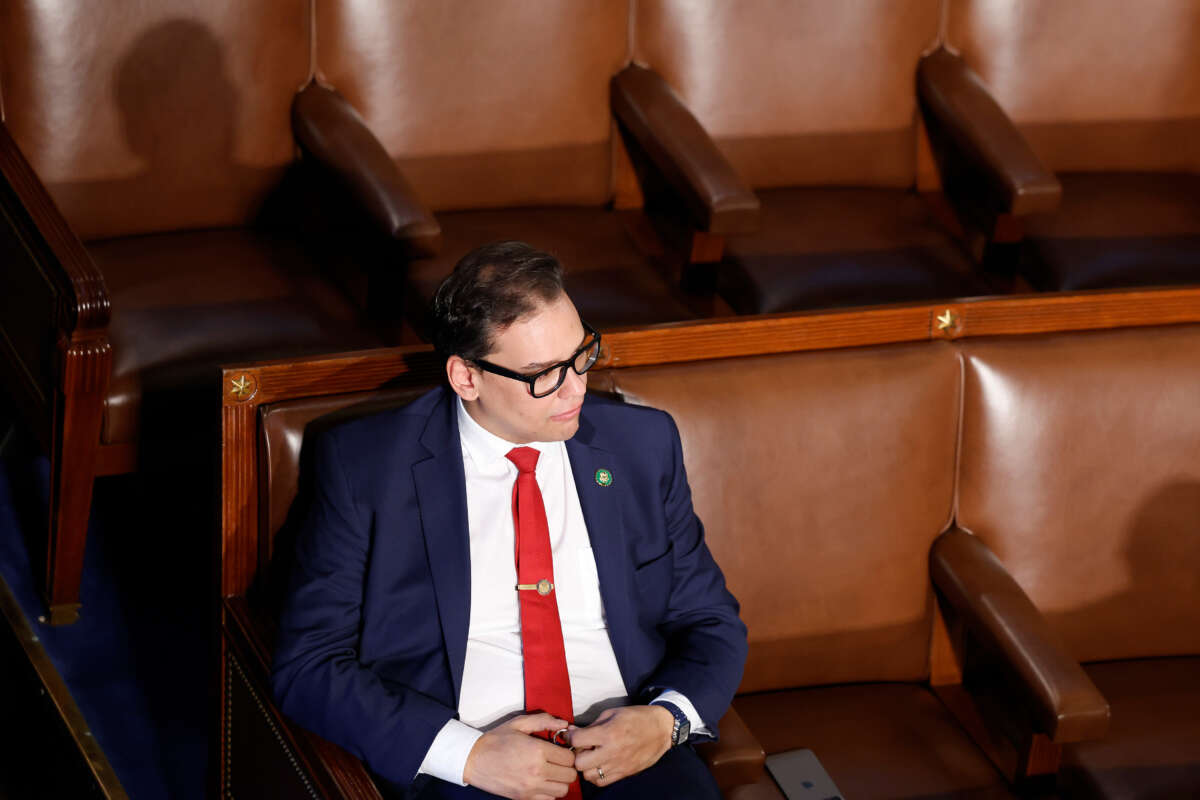Did you know that Truthout is a nonprofit and independently funded by readers like you? If you value what we do, please support our work with a donation.
Caught in between several complaints over potential financial improprieties, Republican Rep. George Santos (New York) has changed course on the $705,000 that he previously claimed to have loaned to his campaign, now saying that the money wasn’t actually entirely from personal funds.
On Tuesday afternoon, Santos’s campaign filed 10 amended campaign finance reports with the Federal Election Commission (FEC). They showed, among other things, that a $500,000 loan and a $125,000 loan that the campaign had previously indicated were personal loans weren’t from “personal funds of the candidate,” with that box on the form left unchecked in the amended filing. The forms do not clarify where the money came from.
Prior to the new filings, which were likely made in response to an unusual amount of FEC inquiries sent to the Santos campaign, there had already been a flurry of questions surrounding the personal loans. Officials and experts questioned where the money came from when Santos was thousands of dollars in debt to creditors and landlords just two years before the loans were reportedly made.
Now, there are questions on which part of the financial filings constitute a misrepresentation of the truth from the serial liar, and concerns over where the $625,000 came from if not from Santos’s personal bank account.
The latter question in particular could cause even more problems for Santos, as the source of the funds could potentially point to illegal activity, at least one expert has said.
“If the candidate’s personal wealth wasn’t the source of the loan, then what was?” Brett G. Kappel, an election lawyer who advises politicians on campaign finance, said to The New York Times. “The only other permissible source would be a bank, and they would require collateral for a loan of this size. If a bank wasn’t the source of the funds, then the only alternatives are illegal sources.”
Kappel said that the campaign’s financial filings were some of the strangest he’d ever seen. “This one is in the bizarre category,” he said.
Jordan Libowitz, spokesperson for watchdog group Citizens for Responsibility and Ethics in Washington (CREW), also pointed out the unusual nature of the documents.
“I have never been this confused looking at an FEC filing,” Libowitz said. According to Libowitz, while some inexperienced candidates do sometimes struggle with following campaign finance laws, Santos’s filings are particularly strange.
If Santos is found to have broken the law, Republicans have vowed to remove him from Congress, though House Speaker Kevin McCarthy (R-California) has spent the last weeks defending Santos — who voted for McCarthy for speaker — despite his questionable claims.
Santos is facing a litany of other problems, ranging from the legal to the political. The Campaign Legal Center filed a complaint with the FEC against him earlier this month alleging that the campaign likely violated several campaign finance laws, including with the personal loans; House Democrats had also pointed out the loans in a complaint filed with the House Ethics Committee earlier this month, and said that the financial disclosures themselves were likely filed improperly.
The New York Times additionally uncovered two weeks ago that a group called RedStone Strategies reportedly raised over $800,000 for Santos’s campaign. But the FEC has no record of RedStone as a political group, and the organization appears to share a name with a company, RedStone Strategies LLC, which has ties to Santos. Apparently, a donor gave $25,000 to RedStone Strategies just days ahead of a $125,000 loan that Santos made to his campaign that the new filings now say weren’t from Santos’s personal funds.
The embattled lawmaker is also facing credibility issues. Republicans are not trusting him with top committee assignments, especially ones that involve intelligence information — though they have seated him on two committees, the Committee on Small Business and the Committee on Science, Space, and Technology.
In the public sphere, Santos is doing even worse. Polling from Siena College conducted last week found that 76 percent of suburban New York residents — a demographic that makes up a majority of Santos’s district — view him unfavorably, while 59 percent of New York residents want Santos to resign.
A terrifying moment. We appeal for your support.
In the last weeks, we have witnessed an authoritarian assault on communities in Minnesota and across the nation.
The need for truthful, grassroots reporting is urgent at this cataclysmic historical moment. Yet, Trump-aligned billionaires and other allies have taken over many legacy media outlets — the culmination of a decades-long campaign to place control of the narrative into the hands of the political right.
We refuse to let Trump’s blatant propaganda machine go unchecked. Untethered to corporate ownership or advertisers, Truthout remains fearless in our reporting and our determination to use journalism as a tool for justice.
But we need your help just to fund our basic expenses. Over 80 percent of Truthout’s funding comes from small individual donations from our community of readers, and over a third of our total budget is supported by recurring monthly donors.
Truthout has launched a fundraiser, and we have a goal to add 242 new monthly donors in the next 48 hours. Whether you can make a small monthly donation or a larger one-time gift, Truthout only works with your support.
